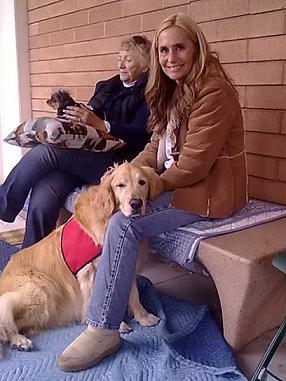
GROSSMONT COLLEGE–Years ago, the mother of Nadra Farina-Hess was hospitalized. Farina-Hess, one of Grossmont’s librarians, would bring her dog with her to visit her mom; afterwards, having been delighted by the positive response from her mom and other patients, Farina-Hess began to study various research about the use of therapy dogs as catalysts for stress relief.
She said that, along with her discoveries as to the benefits of therapy dogs, they are increasingly employed in high-stress situations, particularly at higher-learning institutions, including Tufts University in Massachusetts, Oberlin College in Ohio, Yale Law Library, and even our neighbors at UC San Diego.
Farina-Hess is presently working to coordinate the use of therapy dogs, here on campus, with both the Office Professional Training program, and Occupational Therapy Program.
The former students would receive the typical therapy from the dogs, whereas the latter students would shadow the therapy dogs as the dogs work, thereby learning–first-hand–the healing effects therapy dogs.
Some of the effects of therapy dogs on patients, according to Farina-Hess, include the following: decreased heart rate and blood pressure, mental stimulation, feelings of acceptance and good rapport, outward focus, opportunities for empathy and nurturing, increased motivation, entertainment, and socialization.
Dogs will occasionally become, themselves, a bit over-stressed from all the attention, said Farina-Hess; however she went on to explain that each person who accompanies a therapy dog is highly sensitive to the dog and will give an over-stressed dog as much time off as necessary for the dog to be cheered-back-up.
Each therapy dog, said Farina-Hess, receives extensive training, and must then pass a “Canine Good Citizen Test” with 100%. Moreover, the dogs are typically covered with one million dollars worth of liability insurance.
Shirley Colman is the founder of Independent Therapy Dogs, whom Farina-Hess contacted about providing dogs for the event on campus. “ coordinated the therapy dogs and their handlers, all of whom volunteer their time,” said Farina-Hess.
In total, 55 faculty, staff and students relaxed with a Therapy Dog, when they visited campus, on Tuesday, May 17.
*
Lindquist is Managing Editor of the GC Summit; email him at [email protected]







